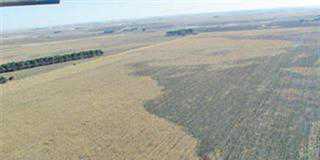Following the announcement, farmers in the fruit producing areas of the province have not laid off any workers, unlike what has happened in Limpopo. Farmers said throwing in the towel was not part of their vocabulary, but changes, such as intensified mechanisation, would have to be made to ensure sustainability of the industry. The chairperson of the Langkloof Farmers’ Association, Marius van der Westhuizen, said agriculture was facing one of its biggest challenges since 1994, as the steep increase in the minimum wage held dire implications for the farming community.
“The Langkloof is a labour intensive, mainly stone fruit production area with an export focus. The wage increase and increases in diesel, electricity and chemical prices cannot be carried over to the consumer, the European housewife,” he said. “The days of disloyal and unproductive workers are numbered as higher wages cannot come without counter performance,” said Van der Westhuizen.
“Agriculture is the biggest job creator in the rural areas and the government wants the farming industry to create an additional million jobs by 2030. Until recently South African farmers believed that local labour was ‘cheap’ and trustworthy. Now it is the most expensive in the world, and untrustworthy,” he added.
Gamtoos Valley Farmers’ Association chairperson, Spes du Preez, said labour intensive farming couldn’t afford the increase. “Wages make up the biggest part of input costs.“We cannot carry this increase through to the consumer, as we are price-takers not price-makers. Workers will be laid off, and this will have a negative social impact at both local and national level. While we will never be able to function without labourers, mechanisation will play an increasingly important role,” said Du Preez.
According to the managing director of the Patensie Citrus Co-operative, Gerhard Uys, the increase would ultimately affect workers in other, higher wage groups. The wage costs in packing stores stood at 30% of total costs. “Mechanisation and automation will be considered on an economically realistic basis. The biggest factor, however, is the distrust now placed in the government. The previous wage increases were completely ignored and replaced with the current one. How long before the next increase will be announced?” he asked.
Mark Keun of the Sundays River Citrus Co-operative said they had started a process of collating data from their extensive grower base that would enable them to understand the effect on growers and address the matter.












